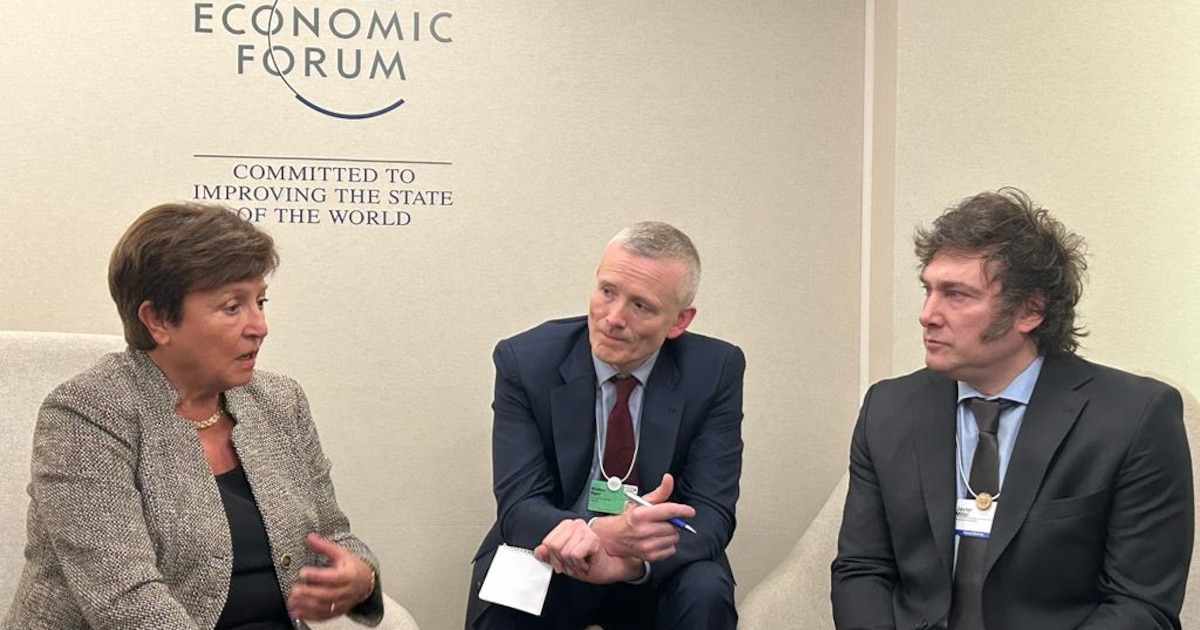All the Answers
Well-known member
Milei's optimism after the trip to the US: he believes that the fiscal goal with the IMF for the first quarter was met - Infobae

Source:

Optimismo de Milei tras el viaje a EEUU: cree que se cumplió la meta fiscal con el FMI del primer trimestre
El presidente está conforme con el desarrollo del ajuste y el ministro Luis Caputo podrá exhibir este logro, junto con la suba de las reservas, en su viaje a Washington esta semana
April 15, 2024
The president is satisfied with the development of the adjustment and Minister Luis Caputo will be able to showcase this achievement, along with the increase in reserves, on his trip to Washington this week

The Government is confident that it has met the ambitious fiscal goal agreed with the International Monetary Fund (IMF) in the first quarter of the year.
Very close to President Javier Milei – ecstatic about the “excellent” result of his tour of the United States – they cautiously told Infobae : “We estimate that we are going to meet our goal.”
According to the data handled by official sources, after the surplus of the first two months, a positive result will be reported again next week. “We continue very well. The nominal primary goal is already enough to meet until September more or less,” they indicated before Minister Luis Caputo 's trip to the Fund's semiannual assembly in Washington.
In fact, the goal for the first quarter was to have a primary surplus of $962,000 million and between January and February alone the Government accumulated a surplus of $3.2 trillion.
This is basically due to the cut in spending, because collection shows drops month after month due to the recession, although according to sources, "it is not so bad, at least within what I expected."
According to the latest IMF report, “the authorities aim to achieve a primary surplus of 2% of GDP this year, consistent with global equilibrium, mainly through a combination of temporary (trade-related) taxes and efforts to reduce administrative costs , energy and transportation subsidies, discretionary transfers to provinces and state-owned companies, and infrastructure spending.”

Gita Gopinath, number two at the IMF, with the Minister of Economy of Argentina, Luis Caputo, after a work meeting in Buenos Aires. REUTERS / IMAGE SUPPLIED BY A THIRD PARTY
“The program supports policymakers' efforts to safeguard global balance over time, including through improvements in the efficiency of tax and spending systems, some of which will require support from Congress.
According to the agreement, “an ambitious stabilization plan is being implemented to correct serious policy deviations in the last quarters of 2023. The plan focuses on establishing a strong fiscal anchor along with policies to lastingly reduce inflation , rebuild reserves and address long-standing distortions and impediments to growth.”
“The active baseline assumes that the primary fiscal balance goes from a deficit of 3% of GDP to a surplus of around 2% this year, reaching a stable primary surplus of 2.5% of GDP from 2025,” express.
The analysts' view
In this regard, analyst Gabriel Caamaño maintained that “for now they are complying. They redefined the goals in two senses. Definitions and values. I don't see that they are going to have problems with that.”"In any case, the noise will come later when they start to discuss what they want to do and how, because whether or not Argentina has fresh money, it needs an agreement with the fund to refinance the program signed in 2022 that begins to be paid next year, now Whether or not Argentina has fresh money needs an agreement and I don't think it will be enough with that alone,” Caamaño told Infobae.
“The goals they are playing for now are those of the first quarter and those have been achieved; We have to see if the fiscal package passes and how big the drop in activity is and how much it affects the accounts,” he explained.
“In principle there is fiscal credibility. This means that one tends to believe that if they don't arrive they will cut something like Flintstones, but they don't negotiate that," the expert concluded.
Sebastián Menescaldi from ECO GO added that “for now they are comfortably complying; I think the most complicated will be the fiscal one and its compliance or not will be defined only in the last month of the year.”
“Equally, in advance, it will depend on what happens with the fiscal package. If this is not achieved, it is likely that there will be some deviation sooner, depending on the salary issue. In the case of reserves, we would already be fulfilling what was requested in the second quarter. And on a fiscal level it is feasible that they have managed to reach the fiscal goal, because they had a remainder of the first months.”
“We have to see if it was achieved comfortably or with forceps (increase in floating debt, including energy debt),” he explained.
The Fund explicitly praised Argentina's commitment to go from a 3% deficit to a 2% surplus in one year, but asked the Government to focus on the "quality" of the adjustment and to preserve the most vulnerable sectors .

